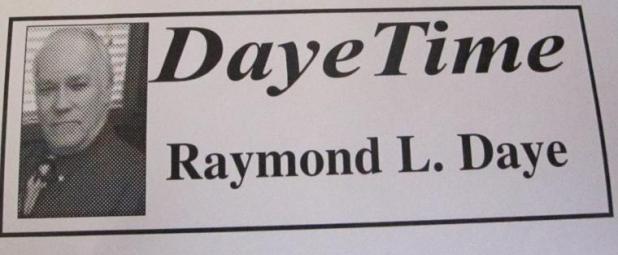
DayeTime: State should set maximum mayoral salaries for small municipalities
While Mansura Mayor Kenneth Pickett’s salary of $36,000 a year ($3,000 a month) is significantly higher than the other eight mayors’ in Avoyelles Parish, he isn’t the first or only mayor whose salary has caused controversy.
Several small municipalities in the state pay their mayors what most would consider inappropriately high salaries for what is usually a part-time job. A few of those situations have made headlines.
To our north, Ferriday City Council members voted earlier this year to reduce Mayor Sherrie McMahon’s salary from $52,224 to $44,000. She vetoed the measure. Ferriday has a population of about 3,500.
The council overrode that veto twice. The first was 3-0 in a special meeting when the mayor, town clerk, town attorney and one alderman were out of town and the mayor pro tem of the council couldn’t vote. Since an override vote has to be in a regular meeting, the council voted 4-0 to override in the next regular meeting.
The override is being challenged because salary reduction is to take effect immediately, and state law prohibits an elected official’s pay from being reduced during the current term.
But that’s Ferriday’s problem.
A couple of years ago there was an uproar to the south concerning White Castle Mayor Gerald Jemarr Williams’ salary, which was raised to over $50,000 to serve the town of 1,900. There were also allegations of expense account “errors” and other problems.
Williams had a TV reporter arrested for requesting a public record related to the mayor’s salary and expense account. The charges were dropped, but the arrest showed a defensive, heavy-handed approach by the mayor to dealing with anyone questioning his salary.
But that’s White Castle’s problem.
But what about Mansura and its problem.
SEEK A SOLUTION
When similar problems occur in several areas, one might think that maybe, JUST MAYBE, someone or several someones in a position of authority might want to try to solve that problem.
There is no limit established in state law or the Louisiana Constitution on how much a municipality can pay its elected officials. There should be.
The “blank check” approach leaves open the potential of -- theoretically speaking -- a mayor “convincing” three council members to increase a monthly stipend of a few hundred dollars to a full-time salary of a few thousand per month.
If that salary is set, for instance, on the first day of the mayor’s four-year term, it is there for at least four years.
Even if the voters rise up and recall the mayor and his cronies, the town would not be able to recoup the money paid prior to the removal.
Aldermen can raise salaries of elected officials on a majority vote, but state law prevents them from reducing those salaries during the elected official’s current term in office.
A Louisiana Municipal Association attorney said the “term in office” has been interpreted by the courts to begin when the candidate qualifies to run for that office.
Small cities may need a full-time manager to oversee department heads who, in turn, have dozens of employees. That job could be done by the mayor or by a full-time city manager.
Small towns do not need a full-time administrator because the total number of employees may only be a dozen or so.
In bygone days, people ran for mayor solely to serve the public. The monthly pay compensated them for the two or three hours a month needed to prepare for and attend the monthly meeting and the time spent addressing constituents’ questions in between meetings.
I am told that some “old school” mayors used their monthly stipend to pay for special projects to benefit the town.
Paying large salaries for a job intended to be part-time could attract candidates more interested in making easy money than in serving the public.
Maybe a legislator or two will consider filing a bill in the next regular session that would establish a fair way to determine the maximum pay for mayors.
While Pickett would disagree with my suggested criteria -- based on his comments in recent council meetings -- the only objective and fair measure I see would be by population.
PROPOSED SALARY CAPS
Just for discussion’s sake, I would think the maximum monthly salary for mayors could be $500-$800 for villages (under 1,000 pop.), $1,500-$2,000 for towns (1,000-4,999 pop.), $2,500-3,000 for small cities (5,000 to 15,000 pop.) and $4,000-5,000 for mid-sized cities (15,001-24,999 pop.).
A city of 25,000 to 100,000 would need a full-time mayor with an appropriate full-time salary of up to $10,000 a month.
There should be no cap for the very large cities. Let their conscience, their budget and their constituents be their guide.
Of course, a municipality could pay its mayor less than the allowed maximum. I expect many, if not most, would -- for a variety of reasons, fiscal and philosophical.
Chances are pretty good the above suggestion will never be presented. If some version of it is proposed, it would probably be shot down for being some sort of “Big Brother” infringement on local government’s autonomy. I would classify such a proposal as an attempt to protect the public from a small number of opportunistic politicians taking advantage of a void in state statutes rather than Big Government’s effort to establish some sort of totalitarian control over the municipalities.
If such a law were adopted, unless it specifically stated the salary would be immediately reduced to the allowed maximum upon approval of the law, towns would still be stuck paying those high salaries until the next election.
However, if such a law is never passed, those big salaries in small towns will keep on rolling by like the rivers and bayous that grace this state -- but not as beneficial or as beautiful.
